|
The current review advances knowledge of women’s economic empowerment by systematically reviewing qualitative literature to address the following key question: What are the main barriers to, and facilitators of, women’s employment in male-dominated sectors with higher or growing productivity in low- and middle-income countries? By focusing on qualitative research, which is deeply contextual, this systematic review speaks to aspects of social and economic experiences that cannot be fully captured in quantitative analysis.
|
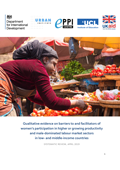 |
|
The study was funded by the Australian Agency for International Development’s (AusAID) Australian Development Research Awards Scheme (ADRAS) as part of a joint call for systematic reviews with the Department for International Development (DFID) of the UK, and the International Initiative for Impact Evaluation (3ie).
|
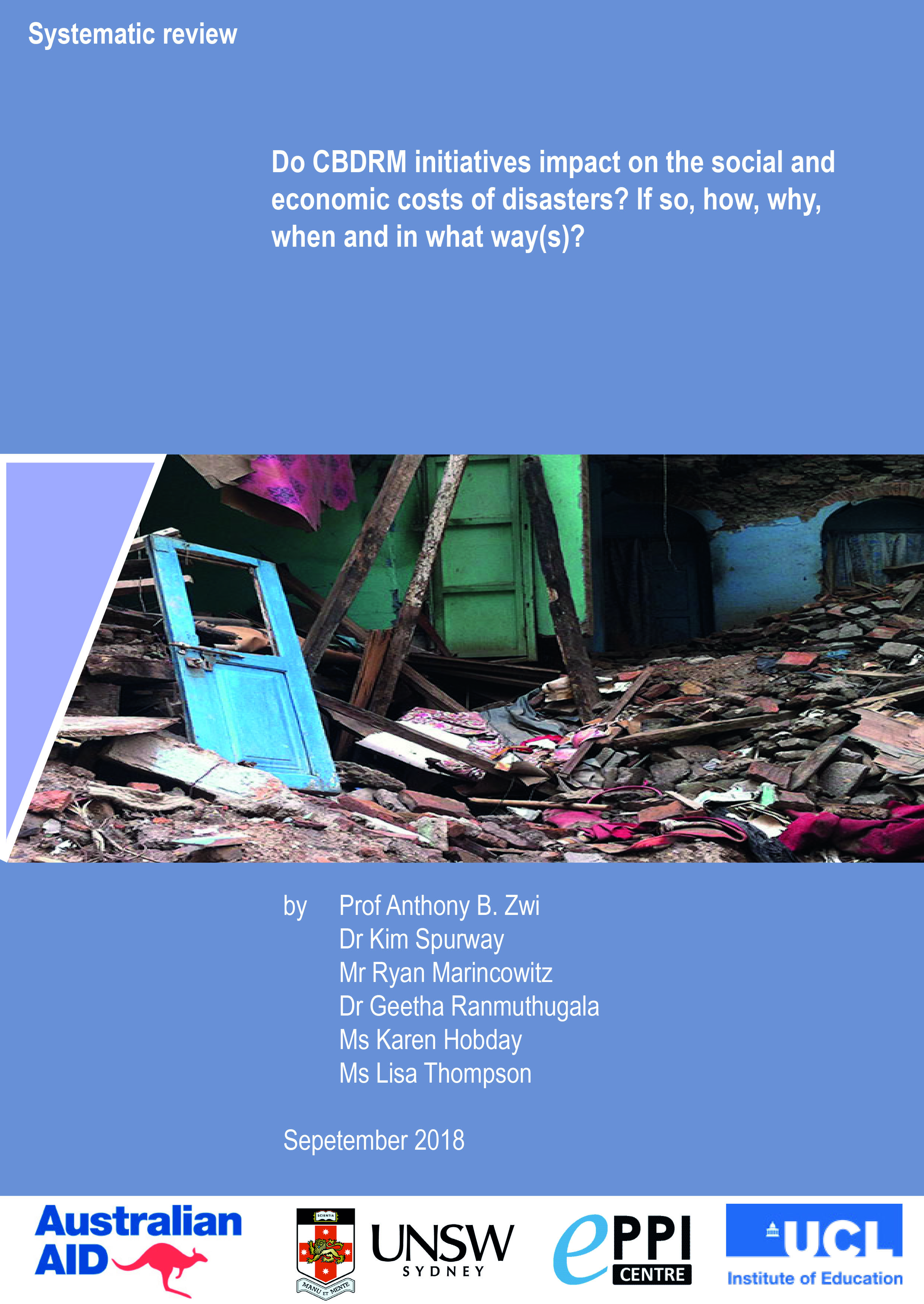 |
|
This systematic review provided an evidence map and structured synthesis on the effects of interventions aiming to support women’s participation in wage labour in higher-growth/male-dominated sectors in LMICs.
|
 |
|
The rapid evidence summary elucidates methodological rigor adopted in the systematic reviews. The methodology used in this rapid evidence summary consists of following steps: sourcing, search strategy and management, screening and selection, data extraction and synthesis.
|
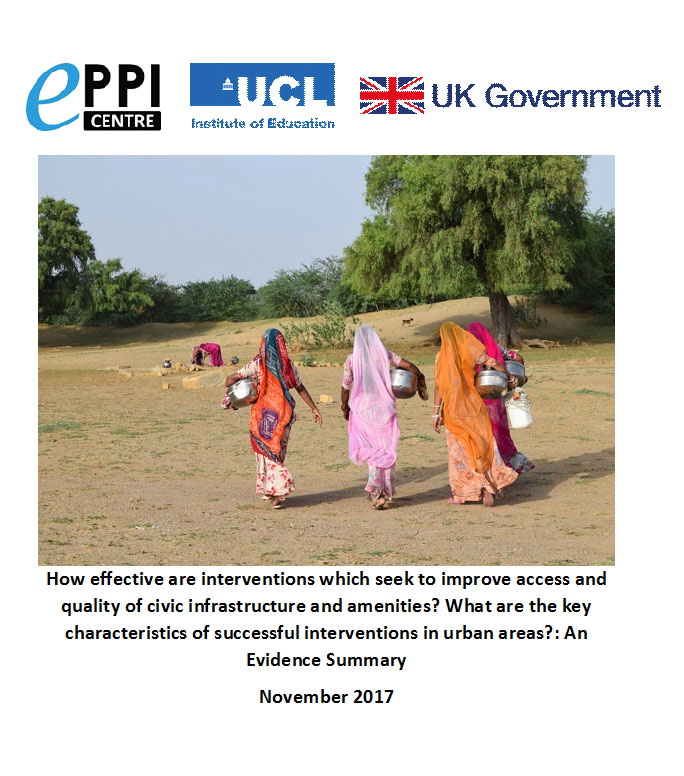 |
|
This systematic review summarises and amalgamates the available evidence on how effective are public works programmes in stimulating local economic transformation in low-and middle-income countries (LMICs). The systematic review was a two stage review, the first stage was conducted to understand the scope of the review in terms of population, intervention, comparison, outcome, study design and location. After the stage one, the team evaluated on the proposed research questions with EPPI Centre and DFID
|
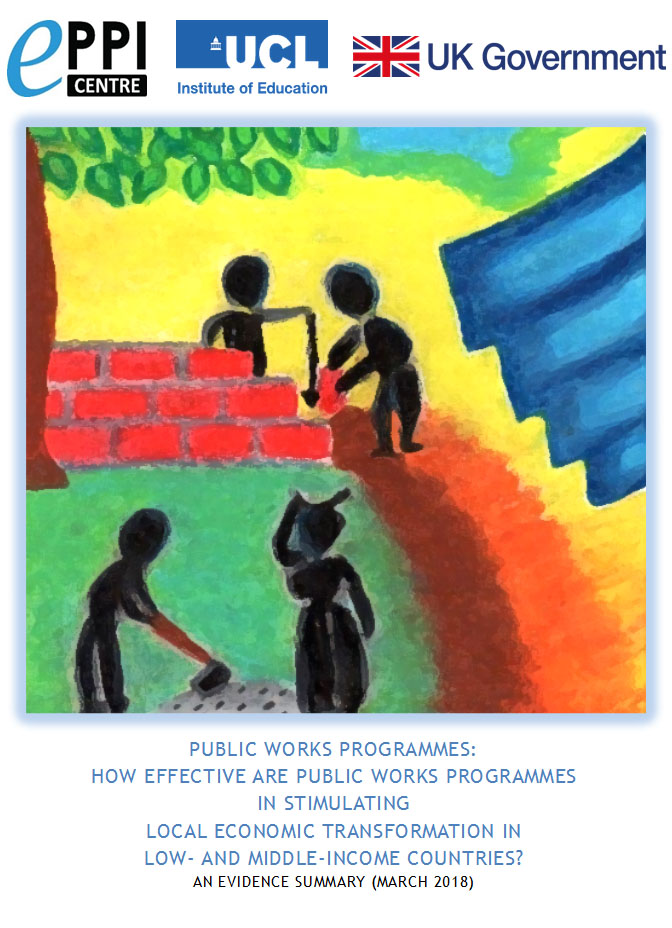 |
|
This evidence summarises 11 systematic reviews focusing on the employment and its related outcomes of training interventions in South Asia. The study has followed the processes of systematic review in searching multiple academic databases and grey literature. The search focused on specific training and employment terms including related words.
|
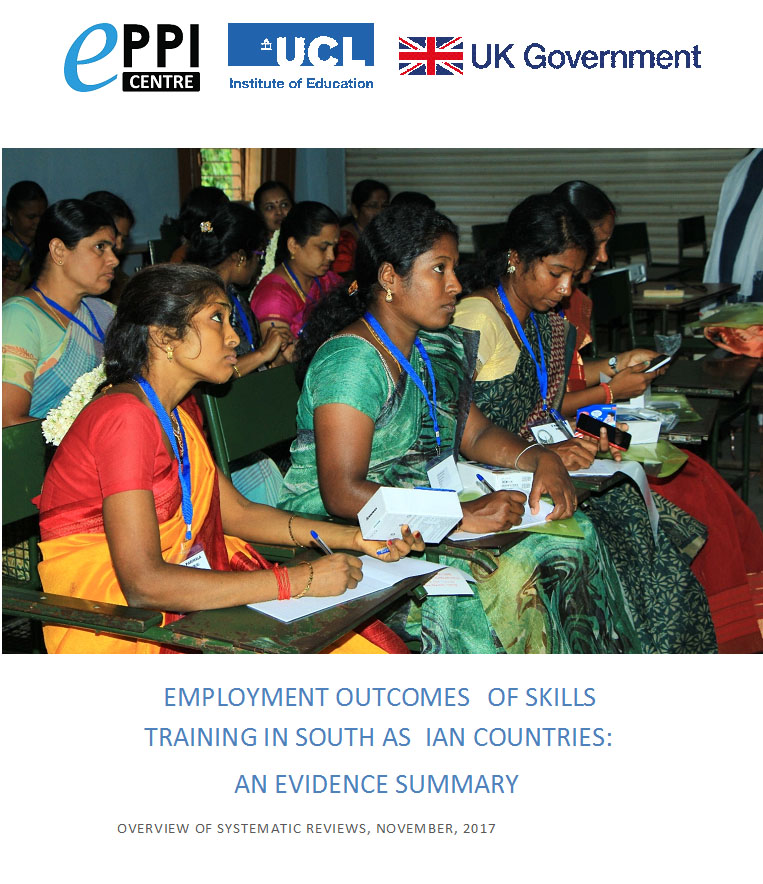 |
|
The rapid evidence summary elucidates methodological rigor adopted in the systematic reviews. The methodology used in this rapid evidence summary consists of following steps: sourcing, search strategy and management, screening and selection, data extraction and synthesis.
|
 |
|
This document will assist policy-makers and researchers in assessing the evidence in this field in the context of regional setting and conditions. This document presents current evidence regarding effectiveness of interventions in particular contexts which should be interpreted in the form of potential policy implications but not policy recommendations.
|
The meta-review was aimed to summarise the findings from the selected Systematic Reviews (SRs) on the effectiveness of nutrition interventions (i.e. nutrition-specific and nutrition-sensitive) that have been implemented in LMICs on the World Health Assembly
|
|
This paper deploys a configurative systematic review methodology to: i) map the literature on urban disaster risk governance in low- and middle- income countries; and ii) more deeply explore and synthesize the literature on the governance of risk-sensitive land-use planning in urban areas.
|
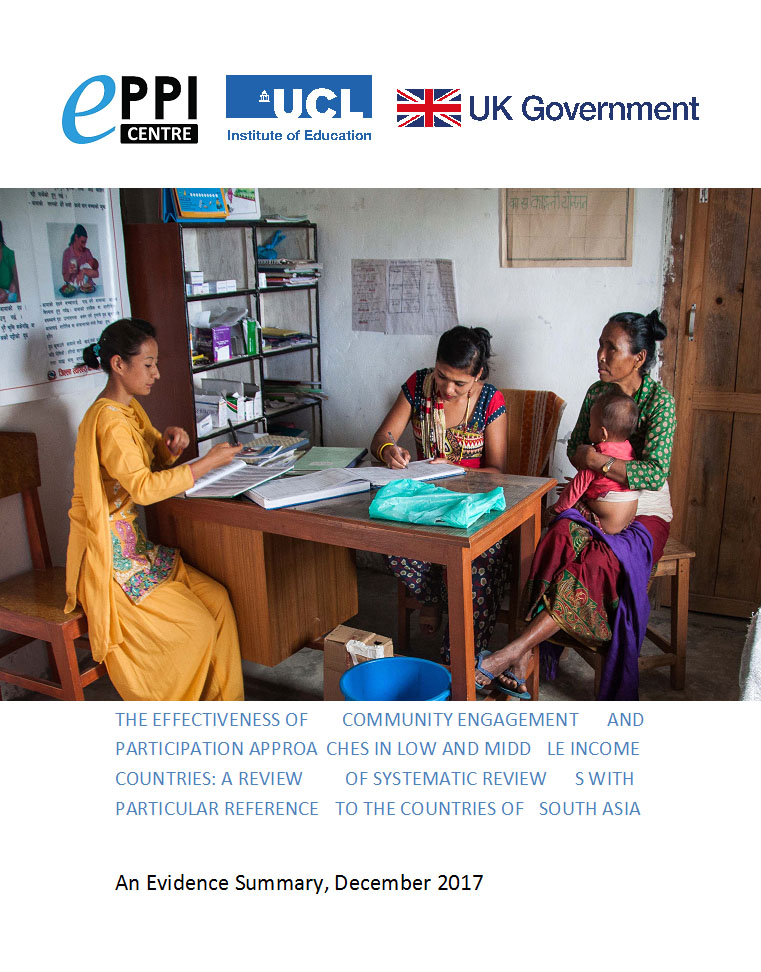
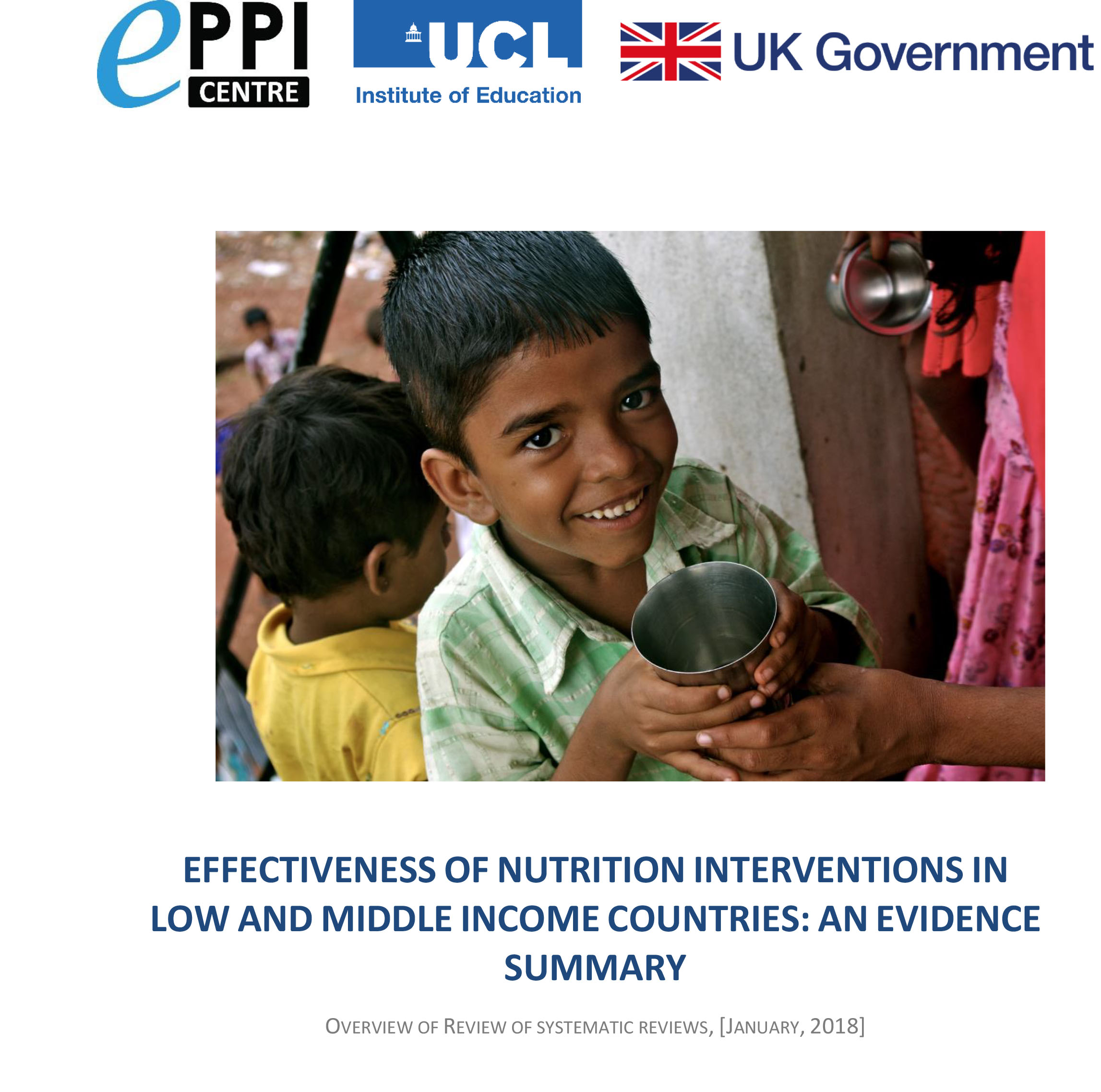
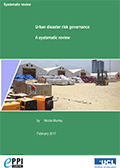
|
|
This systematic review sought to understand the efficacy of natural resource funds (NRFs) as an intervention to manage revenues from mineral resources in low- and middle-income countries experiencing politically fragile circumstances.
|
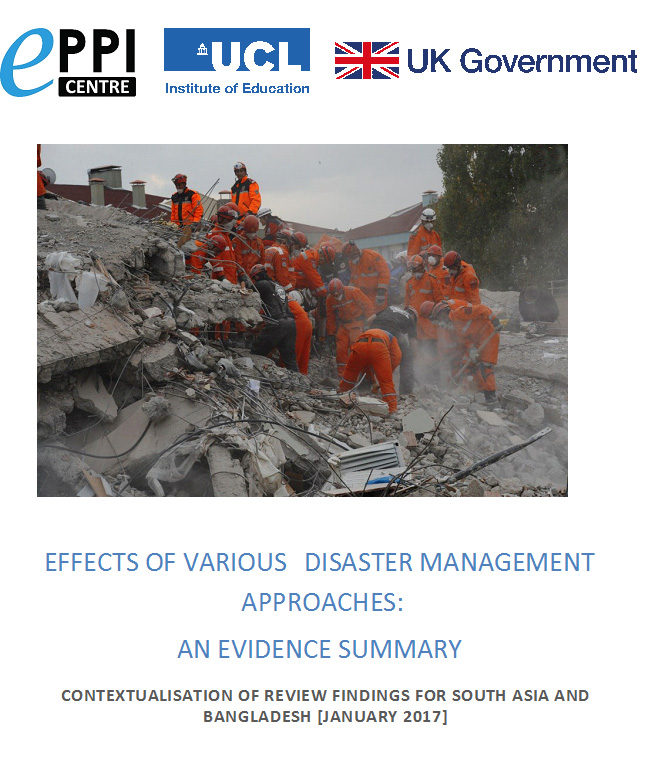 |
|
This systematic review sought to understand the efficacy of natural resource funds (NRFs) as an intervention to manage revenues from mineral resources in low- and middle-income countries experiencing politically fragile circumstances.
|
 |
|
This study has looked at the different models of non-state justice systems in South Asia and has identified the different approaches for strengthening complementarity between the state and non-state justice delivery systems.
|
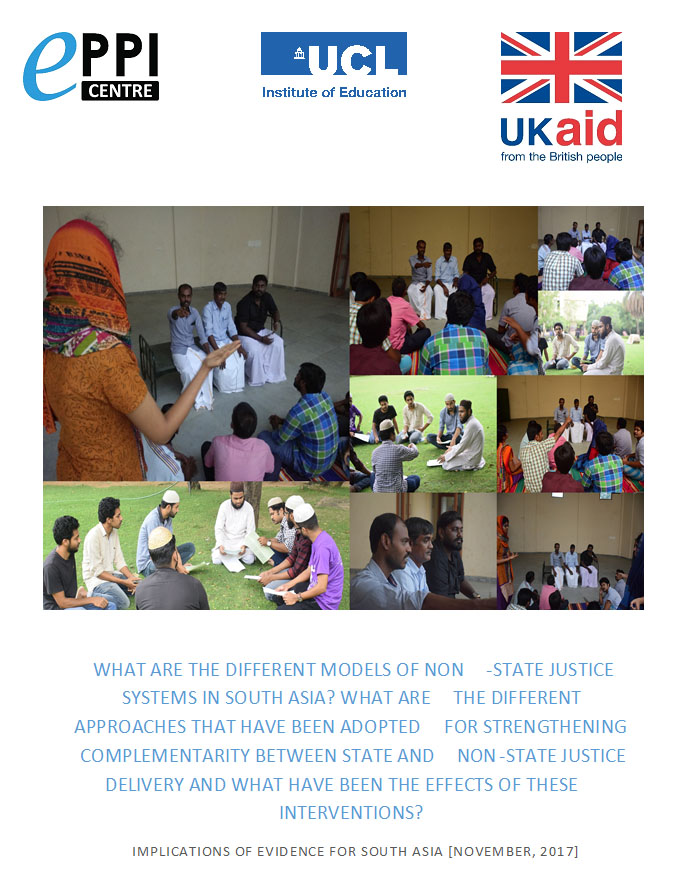 |
|
The review aimed to understand the complex relationship between urbanisation, natural disaster, risk and vulnerability. The project approach was based on the concept that risk arises at the interface of four intersecting domains: urbanisation, natural disasters, vulnerability and risk reduction.
|
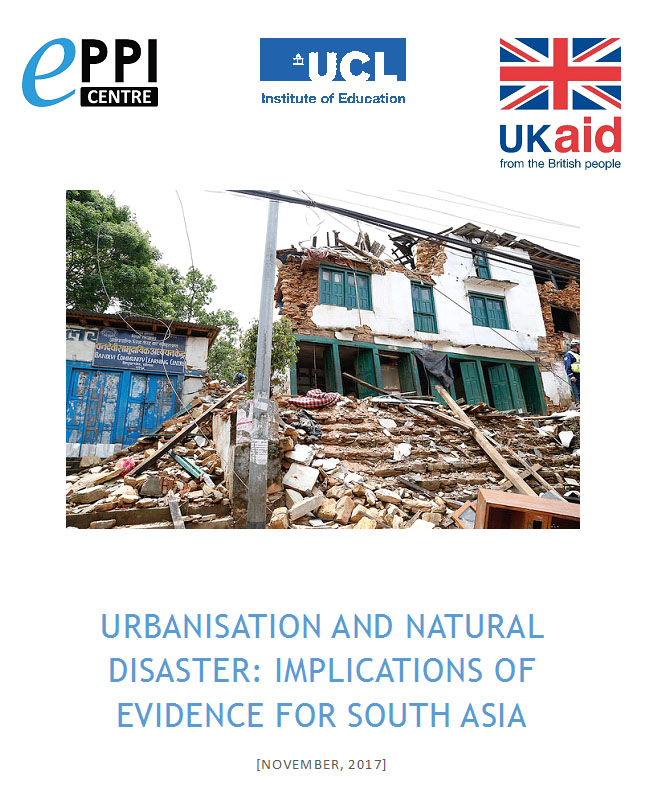 |
|
This brief presents an overview of the evidence on the effects of various interventions and approaches used for enhancing poverty reduction and development benefits of ‘within country migration’ in the South Asian context.
|
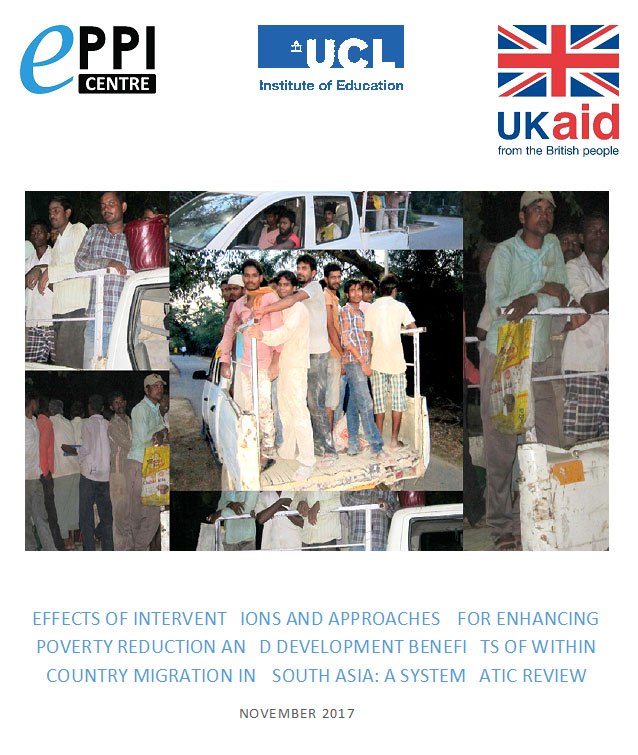 |
|
This systematic review is focused on synthesising the existing evidence on effectiveness of different ‘gender-responsive policing’ (GRP) interventions designed to enhance confidence and satisfaction in policing services and reduce risk of violence against women in low and middle income countries.
|
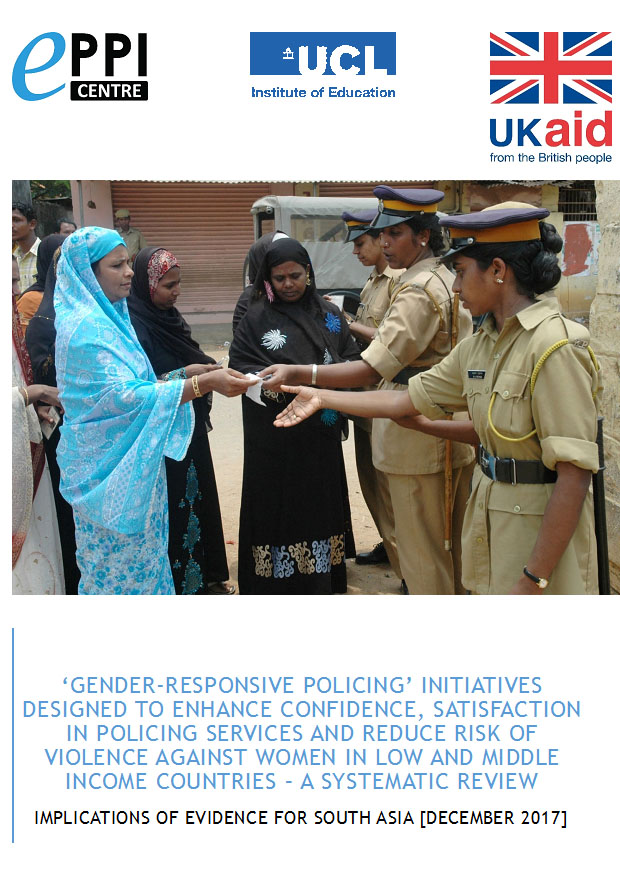 |
|
This evidence summary summarises systematic review-level evidence evaluating the effectiveness of Behavioural Change Communication (BCC) interventions for improving antenatal care (ANC) indicators, specific to low and middle-income country (LMIC) settings.
|
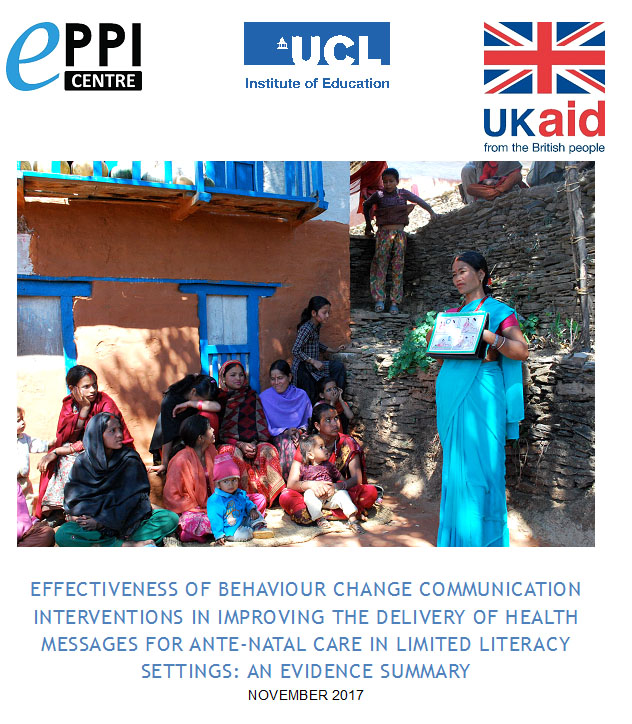 |
|
This systematic review explores how school accountability policies operate locally to improve school systems and children’s learning outcomes in low- and middle-income countries
|
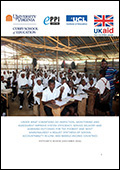 |
|
This systematic review examines the evidence on the effectiveness of different urban-planning approaches in providing access to water, sanitation and electricity services in low-income or informal settlements in Low- and Middle-Income Countries. The study was funded by DFID and conducted by the Indian Institute of Technology Madras
|
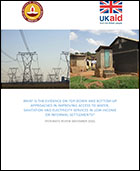 |
|
The aim of this systematic review is to synthesise the findings of quantitative research conducted on the benefits of microfinance intervention and to assess the impact of various interventions in terms of outcomes, target segments, direct/indirect effects, compare the effects with non-participants, and circumstances that make the intervention succeed or fail.
|
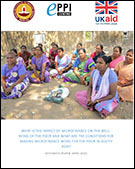 |
|
This qualitative systematic review aimed to develop a greater understanding of peoples’ experiences of participating in microfinance programmes in South Asia; their motivations for participation, their motivations for non-participation, and the views and attitudes of other household and community members toward those who participate
|
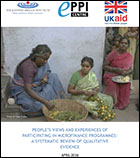 |
|
This review investigated both initial and sustained adoption of WASH interventions at the individual, household and community levels in low- and middle-income countries. The review examined the extent to which existing interventions addressed known barriers to and/or leverage known facilitators of the sustained adoption of water and sanitation technologies.
|
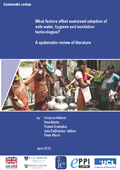 |
|
This report examined specific community accountability interventions (such as community score cards, citizen report cards), and selected decentralisation, school-based management, and community schools initiatives. Community accountability and empowerment interventions, it has been argued, improve educational outcomes by improving the quality of educational services and the participation of students and families in education.
|
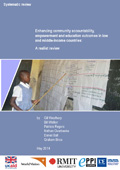 |
|
Because of the importance of the education sector in DFID’s overall aid strategy, as well as the Department’s focus on the education sector in South West Asia (particularly Pakistan), information on what works in education sector interventions is vital to the policy and decision-making processes. This systematic review is part of DFID’s championing of research into evidence of best practice in development policy. It aims to assist DFID in reaching its goals of supporting governments in developing countries in their efforts to improve education quality and outputs. The review also seeks to highlight interventions that provide the greatest impact and value for money.
|
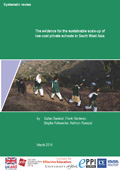 |
|
In many low-and middle-income countries, there is high maternal, infant and child mortality due in part to low contraceptive use and high unmet need for family planning. The aim of this overview of systematic reviews is to synthesise the findings of systematic reviews conducted in this area to assess the impact of various contraceptive methods and mixes of contraceptive methods on contraceptive prevalence, unwanted and unintended pregnancies, and unmet need (a desire to limit the number of children but not currently using any contraception) for family planning in developing countries/regions.
|
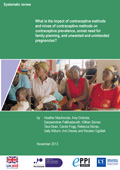 |
|
The main objective of this systematic review was to describe and assess the importance of different enabling and/or limiting factors that have been found to influence the large-scale uptake by households of cleaner and more efficient household energy technologies. These comprise five intervention areas: ICS and four clean fuels, i.e. liquefied petroleum gas (LPG), biogas, solar cookers and alcohol fuels.
|
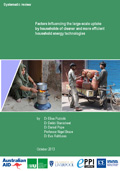 |
|
The goal of this systematic review was to identify those interventions which have been shown to have impact (positive or negative) in promoting community accountability and influencing inclusive service delivery. The remit for the review was very broad, and therefore included interventions across a wide range of settings, including education, employment and health.
|
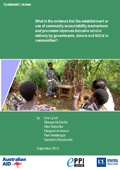 |
|
The aim of this study is to undertake a systematic review of the evidence on the impact of PSP on access and quality in select infrastructure sectors – electricity, telecom, and water supply. As far as the researchers know, no systematic review has been done on this topic yet. Given the need for substantial investments in infrastructure and the focus on mobilising private-sector investment to augment public sector funding, it is felt that the findings of this review can be very relevant and timely for policy makers. It is also expected that this review will contribute to evidence-based policy decision making in this area.
|
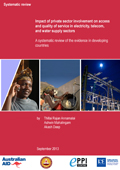 |
|
This systematic review aims to synthesise the evidence on the effectiveness of various approaches to higher education provision in increasing access, quality and completion for students in developing countries.
|
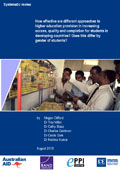 |
|
The aim of this systematic review is to describe the literature evaluating educational initiatives and delivery mechanisms of education for children with disabilities and to identify impact in terms of completion of school, participation and social change.
|
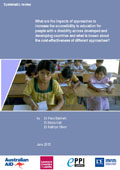 |
|
This review explores the evidence about the impact of these assessment programmes on education policies and the policy making process in developing countries. It is based on an extensive review of the literature prepared by the Australian Council for Educational Research.
|
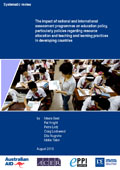 |
|
This review aims to assess the published and grey literature evidence for the effectiveness of supply-side interventions that are intended to improve the health services provided by front-line workers during their interaction with users.
|
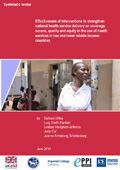 |
|
The review was undertaken to inform decisions on programming for prevention of sexual violence in conflict and crisis situations. This review provides a clearer understanding of what and how interventions for conflict and crisis-related sexual violence operate, which will establish a platform for future interventions. The review also provides a picture of the impact of contextual factors, critical to the success of interventions, and identifies areas requiring more research.
|
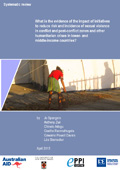 |
|
Grants for agricultural innovation are common but grant funds specifically targeted to smallholder farmers remain relatively rare. Nevertheless, they are receiving increasing recognition as a promising venue for agricultural innovation. They stimulate smallholders to experiment with improved practices, to become pro-active and to engage with research and extension providers.
The systematic review covered three modalities of disbursing these grants to smallholder farmers and their organisations: vouchers, competitive grants and farmer-led innovation support funds
|
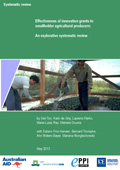 |
|
As a result of the Millennium Development Goal of Universal Primary Education (UPE) and the related Education for All goals, massive recruitment of untrained and less educated schoolteachers has taken place in many low and middle income countries. In many places this has succeeded in meeting the demand caused by vastly expanded pupil enrolment, but there are concerns that it has led to poorer teaching and learning outcomes. Against this background, there is an urgent need to understand better the processes and outcomes involved in the classroom performance of these kinds of teachers and to investigate the various ways in which such teachers may be provided with a belated education, training or upgrading.
|
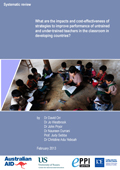 |
|
This review set out to address questions about whether micro-leasing, micro-credit and micro-savings reduce poverty, enable women greater economic empowerment, enable poor clients to engage in economic opportunities and the extent to which these opportunities are meaningful in terms of financial outcomes.
|
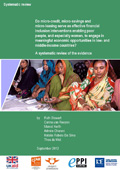 |
|
This question focuses attention on unearned transfers of economic resources (cash or in-kind) in the context of formally organised public, private and nongovernmental social assistance programmes (including micro-credit programmes) in developing countries with the goal of combating poverty.
|
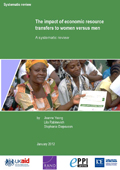 |
|
This systematic review focuses on the evidence about one specific causal mechanism: from better enforcement of contracts to higher rates of capital accumulation.
|
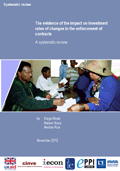 |
|
Education vouchers, a demand-side financing intervention involving the public subsidy of private schooling based on the number of eligible voucher students per school, generally aim to expand parental school choice, which is often promoted to increase competition in the school system. In this paper, we report on a systematic review of evaluations of education voucher programmes in developing countries.
|
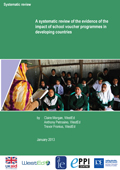 |
|
Despite the widespread belief that the investment in human capital development is a key determinant of economic growth, the empirical estimates especially focusing on low-income countries (LICs) are less than conclusive. The objective of this review is to address the impact of education and skills on economic growth empirically with a view to providing a meta-synthesis of the empirical evidence on the direct effects of human capital investment on growth in LICs.
|
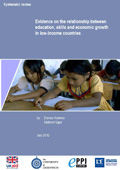 |
|
This study provides a systematic analysis of the empirical literature on the relationship between financial liberalisation and economic growth by conducting a meta-analysis, based on 441 t-statistics reported in 60 empirical studies.
|
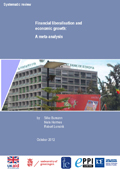 |
|
This systematic review looked into studies reporting on the impact of health insurance schemes that are intended to benefit the poor, mostly employed in the informal sector, in LMICs at a national level, or have the potential to be scaled up to be delivered to a large population.
|
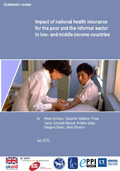 |
|
The aim of this review was to identify interventions which attempt to address the economic barriers faced by girls and young women, in low- and lower-middle income countries, and fragile states. The hypothesis is that if interventions both provide direct access to economic assets for young girls and tackle the wider social issues which impede girls and young women's opportunities to access, build and protect economic assets, this will (i) support their immediate economic, social and psychological well-being (ii) improve their chances of economic success through the accumulation and control of economic assets and (iii) potentially help girls and young women to reframe/change wider social/societal relations.
|
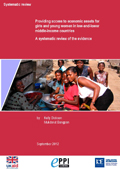 |
|
Corruption is a symptom and an outcome of institutional weakness, with potentially adverse effects on a country’s economic performance. In the last two decades, a wide range of scholars, policy makers and practitioners have expressed concerns that corruption has gone hand-in-hand with extensive liberalisation reforms and led to poor economic outcomes, including slow growth and high levels of growth volatility. This systematic review asks: what is the impact of corruption on economic growth?
|
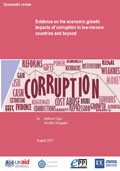 |
|
The objective of this study is to determine the health outcomes from services delivered to the poor by private for-profit, private non-profit and public-sector providers, and the trade-offs between private for-profit, private non-profit and public-sector sources of care for low and middle-income countries (LMIC). The review asks what is known regarding the relative morbidity or mortality outcomes that result from treatment by public or private providers in LMIC.
|
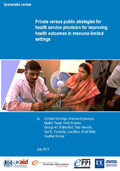 |
|
This systematic review aims to rigorously assess the available evidence on the benefits of AGOA for Sub-Saharan African LDCs in order to arrive at a clear understanding of its effectiveness and impact. The review explains what it is about AGOA that works, for whom it works, in what circumstances and why. In addition the review explores the likely implications of extending full Duty-Free Quota-Free (DFQF) preferences to the US market to all LDCs.
|
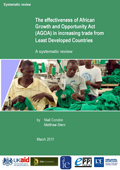 |
|
Public sector corruption is a key barrier to effective service delivery and an impediment to economic growth and development. This report provides findings from a systematic review on the effectiveness of micro-level anti-corruption strategies implemented in developing countries.
|
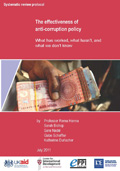 |
|
Maternal health has increasingly emerged as a core priority for several of the world' s largest donors. This review assesses available evidence of how aid delivered under the Paris Principles is impacting upon development outcomes, focusing specifically on maternal and reproductive health (MDG 5).
|
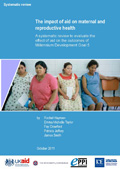 |
|
Addressing the unmet need for post-abortion contraception to prevent repeat unplanned pregnancies remains a key feature of current UK and international policy. Contributing to what is a relatively unexamined field, this project synthesised the findings of evaluations to explore how post-abortion family planning interventions impact on women in low-income countries.
|
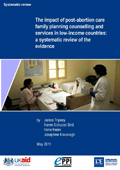 |
|
Voucher programmes aim to improve health by targeting specific populations, encouraging their greater utilization of health services, and enhancing the quality and efficiency of services through contracts and competition. This systematic review synthesizes the findings from evaluations of voucher programmes.
|
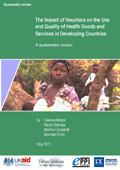 |
|
To help verify whether water, sanitation and health conditions contribute to girls’ educational outcomes, a systematic literature review was conducted to determine what impact the provision of separate toilets for girls has on their primary and secondary school enrolment, attendance and completion.
|
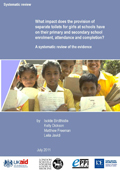 |
|
The Millennium Development Goals (MDGs) have stimulated a plethora of research on civil servant remuneration and poverty reduction through improved civil service performance and Decent Work . Since the year 2000, an emphasis on market forces has directed attention to output-based pay (or pay-for-performance) instead of the payment of decent/liveable fixed salaries that trust public servants to deliver ‘performance-for-pay’, i.e., performance that is contingent on pay rather than vice versa.
This systematic review covers the literature from 2000–2010 and focuses on frontline occupations in health (doctors, nurses, mid-level occupations) and in education (teachers), in low- and middle-income countries. It is based on a pre-prepared protocol and used extensive searches of multiple sources.
|
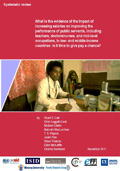 |
|
Because of the growth of the microfinance industry and the attention the sector has received from policy makers, donors and private investors in recent years, existing microfinance impact evaluations need to be re-investigated; the robustness of claims that microfinance successfully alleviates poverty and empowers women must be scrutinised more carefully. Hence, this review re-visits the evidence of microfinance evaluations focusing on the technical challenges of conducting rigorous microfinance impact evaluations.
|
 |
|
Most countries have traditionally imposed import tariffs to protect domestic producers from international competition and increase government revenue. Tariffs create price distortions that allow inefficient sectors to continue producing at the expense of increasing consumer prices. The last two decades, however, have seen the proliferation of regional trade agreements in developing countries. This has reduced tariffs among regional partners. In addition, in some cases, preferential liberalisation has been accompanied by domestic trade reform where countries reduced tariffs unilaterally. The purpose of this review is to synthesise the evidence of the impact of tariff reductions on employment and tax revenue.
|
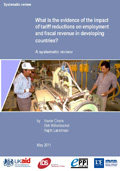 |
|
There is a need for more rigorous evaluation of the impact of agricultural interventions on the nutritional status of children. Opportunities for improvement include: use of a control group, randomisation and long term follow-up; analysing the characteristics and circumstances of those who do or do not participate; studies sufficiently large for detecting statistically significant differences; measures such as total household income, children’s height and weight; and the application of appropriate statistical tests.
|
 |
|
The poor's access to formal financial services is limited and the services available do not meet their requirements. Instead poor people tend to juggle financial relationships with financial institutions and with friends and family. One of the main forms of financial service available to them is 'micro-credit'. This industry began with NGOs in the 1970s, and has grown into a global market provided by commercial financial institutions for profit.
Whilst the movement began in Asia and has been well researched there, relatively little is known about micro-credit in sub-Saharan Africa. The region is one of the poorest in the world, with a concentration of the poorest of the poor, whom micro-credit services aim to serve. This project mapped out the literature on micro-credit interventions in sub-Saharan Africa and synthesised the findings of evaluations to explore how micro-credit initiatives impact on the poor.
|
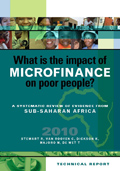 |
|
Many pregnancy complications are unpredictable and many women in developing countries live far away from where life-saving care is available. Referral interventions aim to address these problems. This systematic literature review and meta-analysis assessed the effectiveness of interventions which enabled the transfer of women with emergency obstetric complications from their homes, or from first contact with the health service, to an emergency obstetric care facility, in developing countries. Interventions such as the organisation of communities to generate funds for transport, implemented as part of other community mobilisation activities, reduced neonatal deaths, but the effects on maternal outcomes is not conclusive.
|
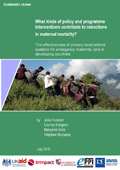 |
|
The purpose of this paper is to report on a systematic review of research on the effectiveness of interventions aimed at increasing teacher attendance in developing countries, as measured by the rate of teacher attendance. Whenever data are available we also estimate the impact of these programmes on student achievement.
|
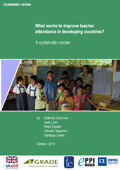 |